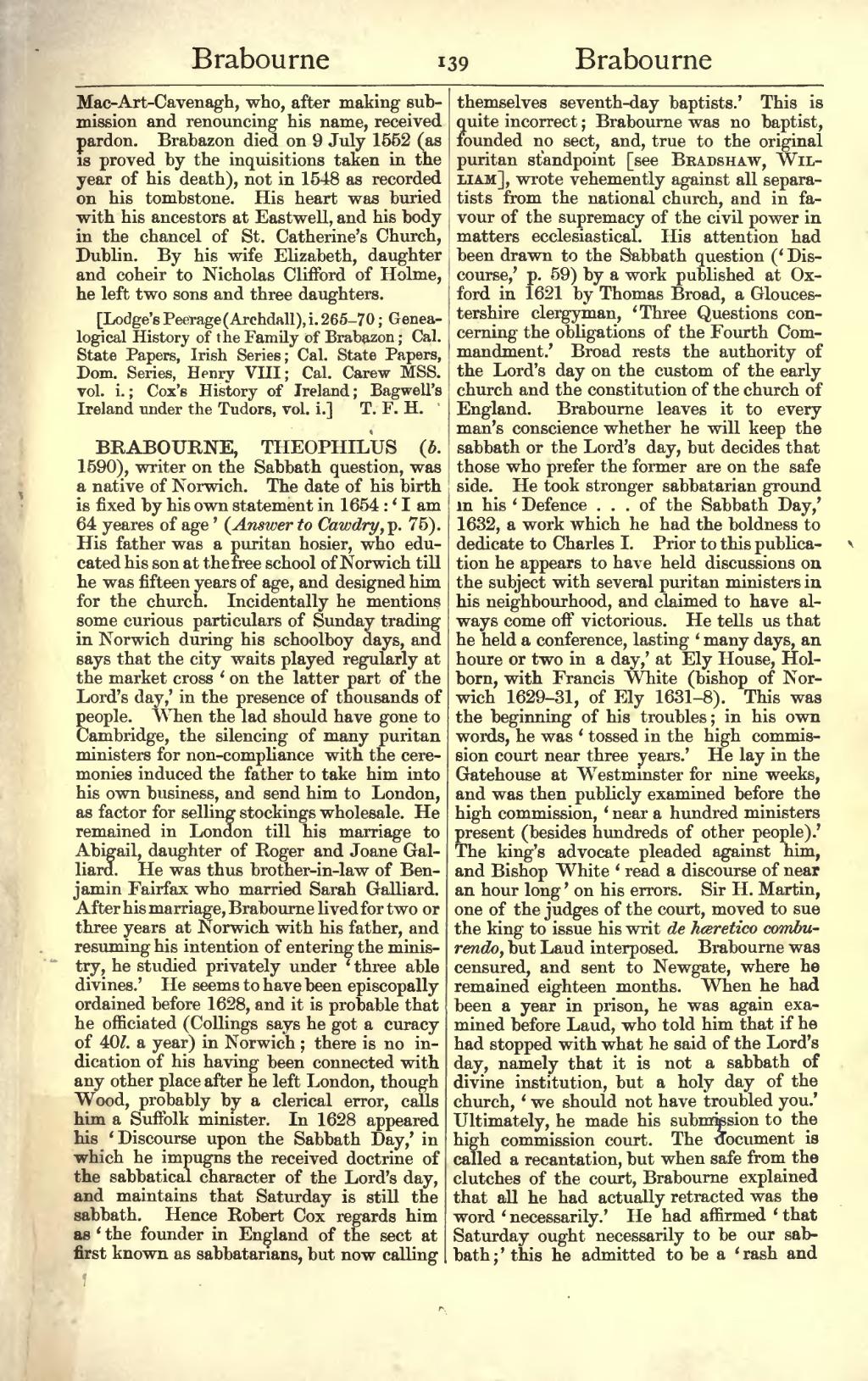Mac-Art-Cavenagh, who, after making submission and renouncing his name, received pardon. Brabazon died on 9 July 1552 (as is proved by the inquisitions taken in the year of his death), not in 1548 as recorded on his tombstone. His heart was buried with his ancestors at Eastwell, and his body in the chancel of St. Catherine's Church, Dublin. By his wife Elizabeth, daughter and coheir to Nicholas Clifford of Holme, he left two sons and three daughters.
[Lodge's Peerage (Archdall), i. 265-70; Genealogical History of the Family of Brabazon; Cal. State Papers, Irish Series; Cal. State Papers, Dom. Series, Henry VIII; Cal. Carew MSS. vol. i.; Cox's History of Ireland; Bagwell's Ireland under the Tudors, vol. i.]
BRABOURNE, THEOPHILUS (b. 1590), writer on the Sabbath question, was a native of Norwich. The date of his birth is fixed by his own statement in 1654: 'I am 64 yeares of age' (Answer to Cawdry, p. 75). His father was a puritan hosier, who educated his son at the free school of Norwich till he was fifteen years of age, and designed him for the church. Incidentally he mentions some curious particulars of Sunday trading in Norwich during his schoolboy days, and says that the city waits played regularly at the market cross 'on the latter part of the Lord's day,' in the presence of thousands of people. When the lad should have gone to Cambridge, the silencing of many puritan ministers for non-compliance with the ceremonies induced the father to take him into his own business, and send him to London, as factor for selling stockings wholesale. He remained in London till his marriage to Abigail, daughter of Roger and Joane Galliard. He was thus brother-in-law of Benjamin Fairfax who married Sarah Galliard. After his marriage, Brabourne lived for two or three years at Norwich with his father, and resuming his intention of entering the ministry, he studied privately under 'three able divines.' He seems to have been episcopally ordained before 1628, and it is probable that he officiated (Collings says he got a curacy of 40l. a year) in Norwich; there is no indication of his having been connected with any other place after he left London, though Wood, probably by a clerical error, calls him a Suffolk minister. In 1628 appeared his 'Discourse upon the Sabbath Day,' in which he impugns the received doctrine of the sabbatical character of the Lord's day, and maintains that Saturday is still the sabbath. Hence Robert Cox regards him as 'the founder in England of the sect at first known as Sabbatarians, but now calling themselves seventh-day baptists.' This is quite incorrect; Brabourne was no baptist, founded no sect, and, true to the original puritan standpoint [see Bradshaw, William], wrote vehemently against all separatists from the national church, and in favour of the supremacy of the civil power in matters ecclesiastical. His attention had been drawn to the Sabbath question ('Discourse,' p. 59) by a work published at Oxford in 1621 by Thomas Broad, a Gloucestershire clergyman, 'Three Questions concerning the obligations of the Fourth Commandment.' Broad rests the authority of the Lord's day on the custom of the early church and the constitution of the church of England. Brabourne leaves it to every man's conscience whether he will keep the sabbath or the Lord's day, but decides that those who prefer the former are on the safe side. He took stronger Sabbatarian ground in his 'Defence ... of the Sabbath Day,' 1632, a work which he had the boldness to dedicate to Charles I. Prior to this publication he appears to have held discussions on the subject with several puritan ministers in his neighbourhood, and claimed to have always come off victorious. He tells us that he held a conference, lasting 'many days, an houre or two in a day,' at Ely House, Holborn, with Francis White (bishop of Norwich 1629-31, of Ely 1631-8). This was the beginning of his troubles; in his own words, he was 'tossed in the high commission court near three years.' He lay in the Gatehouse at Westminster for nine weeks, and was then publicly examined before the high commission, 'near a hundred ministers present (besides hundreds of other people).' The king's advocate pleaded against him, and Bishop White 'read a discourse of near an hour long' on his errors. Sir H. Martin, one of the judges of the court, moved to sue the king to issue his writ de hæretico comburendo, but Laud interposed. Brabourne was censured, and sent to Newgate, where he remained eighteen months. When he had been a year in prison, he was again examined before Laud, who told him that if he had stopped with what he said of the Lord's day, namely that it is not a sabbath of divine institution, but a holy day of the church, 'we should not have troubled you.' Ultimately, he made his submission to the high commission court. The document is called a recantation, but when safe from the clutches of the court, Brabourne explained that all he had actually retracted was the word 'necessarily.' He had affirmed 'that Saturday ought necessarily to be our sabbath;' this he admitted to be a 'rash and
